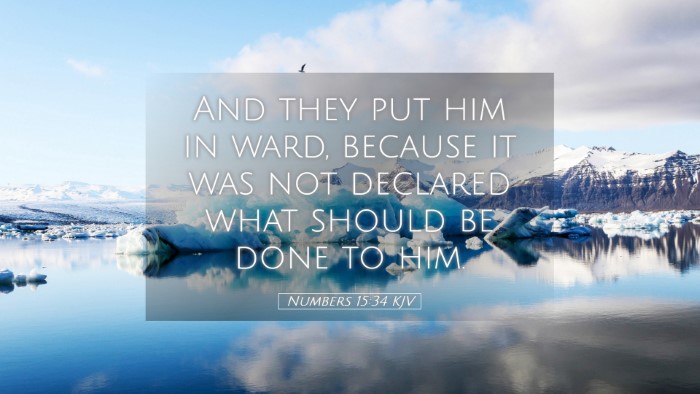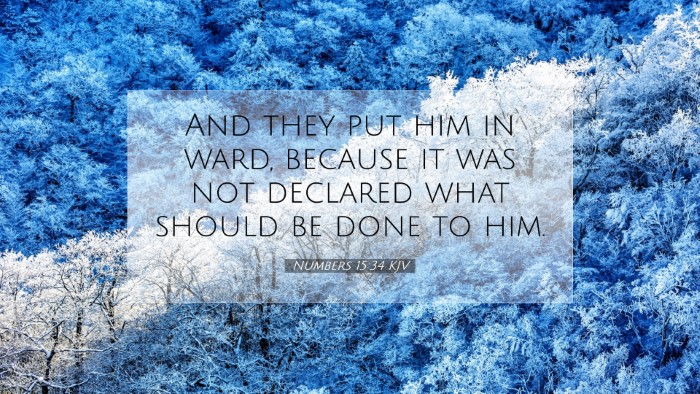Commentary on Numbers 15:34
Numbers 15:34 states: "And they put him in ward, because it was not declared what should be done to him." This verse offers a profound moment within the narrative of the Israelites' journey through the wilderness. In this commentary, insights are drawn from public domain sources to unpack its theological and practical implications.
Contextual Background
The preceding chapters of Numbers detail the laws, rituals, and guidelines for the Israelites as they navigate their relationship with God. This particular verse comes shortly after the introduction of new laws concerning offerings, indicating its placement within significant teachings about holiness and obedience in community life.
Exegesis and Theological Insights
In understanding Numbers 15:34, it is critical to consider the context of disobedience and the state's response to wrongful actions among the community. The man in question violated the Sabbath by gathering sticks, an act that would later be seen as a serious infringement of God's law. Here are some theological insights from respected commentators:
- Albert Barnes:
Barnes highlights the principle that God's law must be upheld with seriousness, signifying how even minor infractions against divine statutes are not taken lightly. He comments on the absence of direct instructions for this specific sin, illustrating the need for community discernment and reliance on divine wisdom in matters of discipline.
- Matthew Henry:
Henry notes the gravity with which Israel was to treat sin within their midst. He emphasizes that the lack of an explicit ruling reflects God's sovereignty in governance and his desire for the leaders of Israel to seek his guidance in bringing about justice. This incident underscores the importance of spiritual leadership and communal adherence to God's commandments.
- Adam Clarke:
Clarke expresses that confinement until an appropriate decree is made illustrates the need for careful consideration by authority figures when addressing transgressions. He suggests that the situation signifies a broader theological point: God's laws are just, and it is the duty of the community to address breaches equitably, highlighting the interplay between mercy and justice.
Practical Applications
From this verse, several practical lessons for pastoral leadership and theological reflection emerge:
- Community Accountability:
The act of placing the offender “in ward” signifies the need for accountability within the church and society. Leaders are tasked with addressing sin calls for wisdom, patience, and a deep reliance on God's guidance.
- Prayerful Discernment:
In cases where laws or outcomes are not explicitly defined, spiritual leadership must seek God's will through prayer and community consensus. This verse challenges pastors to pray deeply before making decisions about disciplinary measures.
- The Holiness of God:
This incident indicates that the holiness of God must be respected above all. The seriousness with which the Israelites are called to react invites reflection on how modern communities respond to sin.
Conclusion
Numbers 15:34 teaches vital lessons about obedience, community, and the nature of divine justice. By engaging with the commentary of theologians like Barnes, Henry, and Clarke, one can appreciate the depth and implications of this moment in Israel’s journey. As contemporary readers and believers, embracing the lessons of accountability, discernment, and reverence for God's holiness remain essential for fostering a community that honors the divine mandate.


